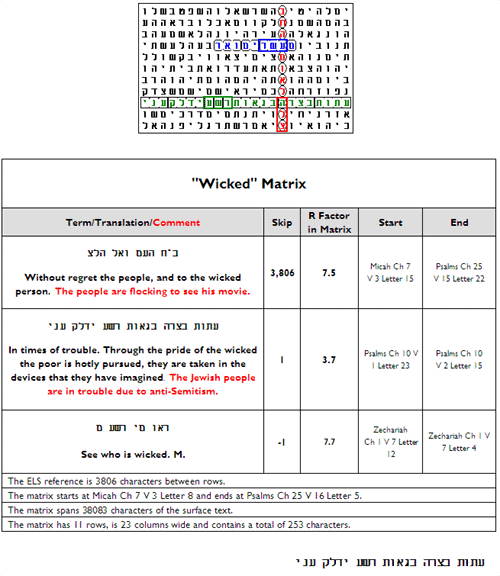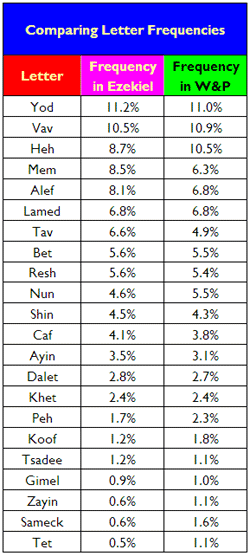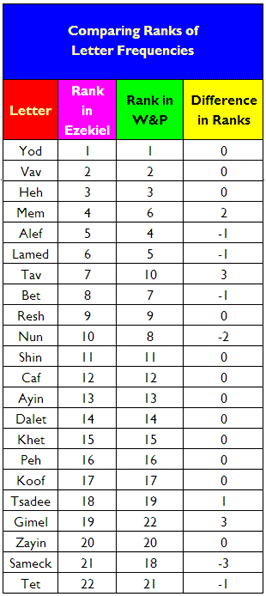146-Letter-Long Mel Gibson
ELS Discovered Continued [SECTION 3]
Can We Trust a Term?
But . . . do we have the right meaning? Is it possible that the above code(s) have a different meaning?
My mother Z.L. told me the following story. The details have been dramatized to illustrate the point, but the basic message is the same now as she told me.
Long time ago, a famous king had a son who was a military genius and in charge of his army. The son had a brilliant idea for a mission-impossible type of a mission to bring great honor to his country. The good king was concerned for the safety of his son and sent to ask for the advice of his best Bible codes expert. Should the son go? Will he win? Will he die? Etc.
The expert looked in the book of Genesis that was then written in Aramaic. He came with the most reassuring message at a minimal skip of -2. It was a world record ELS with over 120 letters which read something like: Rambo the great warrior head of the army son of King Goliath on the (specified proposed date) will go win not die.
The king was delighted and gave the royal approval for the mission. The son went. He won not. He died. The king was furious. He demanded to get an explanation from the Bible codes expert. The expert was perplexed. Your highness! I warned you that your son would die if he goes on that date. It came with an astonishing R-value to prove that I said the truth. The king replied but you said that he: "will go, win, not die." No, said the expert. You misunderstood. I said that he: "will go, win not, die!’
What does a message of a few words mean? Can it be deciphered? Can it mean two opposite things at the same time? Are we going to see what we want to see? Can we interpret it the way we want? Let’s look at another example:
An English professor wrote the words: "A woman without her man is nothing" on the chalkboard and asked his students to punctuate it correctly. All of the males in the class wrote: A woman, without her man, is nothing. All the females in the class wrote: A woman: without her, man is nothing.
Let’s look at the Mel Gibson ELS term that includes the two letters Bet Chet that may be looked upon as the name Bach. Can we say from the Hebrew term

that Mel Gibson is a Bach of the people and G-d? Does the expression mean that Mel Gibson is painted positively in the ELS? Apparently, some believe that this is the case¯on both counts. Now, let us look at a few factors:
Can "Bet Chet" be used as a transliteration for Bach? Answer: Theoretically yes. The transliteration means/sounds the same. The sound is the same. I do not believe that we have enough experience to outright rule out this transliteration. Theoretically, Bach may be a Jew without anyone knowing it. We know of many such cases that a Jewish identity was identified only many years later. By Jewish law, a Jew is someone who has a Jewish mother. This process may go back ten or twenty generations.
Why is it most likely not proper to use it for Bach? Answer: Typically, all non-Hebrew words when being transliterated are written with a Tet and not a Taf; a Chaf and not a Chet, etc. This is especially true for given names. I am not really sure that the "greatest artist" can be the "greatest musician" of a group of people. It is especially awkward in my opinion to apply that to "of G-d."
In developing this specific ELS term, the term may be read in numerous ways. I have seen at least seven different ways of interpreting this term by which a conversation is being carried out by the codes, spelling out that Mel Gibson is NOT a Bach. In fact, the codes are asking the question: Is he a Bach and they answer it: No!
Is Mel Gibson painted positively by the codes? Answer: A few years ago, I made a statement that I do not believe that one long ELS can be taken on its own to give a message. If you read the beginning of this page, you will understand that my upbringing had a little to do with my perception. I discovered that a very long term, say 146 letters long, can actually become a fascinating matrix! In my opinion, that big-term/small-matrix tells a story that does not paint Mel Gibson is a positive light. The punch line, however, is that I have done several Mel Gibson long ELS terms and I found similar messages in them.
Mel Gibson is a Bach of the Nation and G-d???
The first seven shorter versions of this long term are used to dispel the notion that Mel Gibson is a "Bach." Please note that the term has many meanings as outlined below.

Possible Summary of the Story by Terms Above (Commentary)
An innocent person suggests to Mel Gibson that he is a "Bach." Is Mel Gibson a Bach? The Nation and G-d say that he is a wicked person. Mel Gibson insists that he is a Bach, while he Nation and G-d insist: Wicked. Mel Gibson laughs Ha! ()! He is told that these are His people. Mel Gibson continues to laugh Ha. He is told again that these are G-d’s nation, you wicked person. Indeed, it is over for Mel Gibson the definition Bach. The nation and G-d have labeled him Wicked. Mel Gibson is revolting. He mocked/scorned G-d’s people and G-d himself.
So, can we trust one term? No one will argue that we can! In my book Bible codes Breakthrough I give my rules to accept a message as being potentially trustworthy. One of my cardinal rules is that two or three witnesses (or supporting terms) are required. I believe that above, there is a solid case to define Mel Gibson as at least cynical.
Expanding the Matrix
What if we look at the short term above:  . And we try to make a conventional matrix with it? Is this what the codes are trying to tell us?
. And we try to make a conventional matrix with it? Is this what the codes are trying to tell us?

The term above that crosses the long 146 letter-term just below Mel Gibson and crosses the term "the wicked," is part of the first three verses in Psalms Ch 10. I looked up the explanation of those three verses in a book copyright by Y. Orenstein (1968, Yavneh Publishing House, Ltd., Tel Aviv). The explanation of the verses was by Prof. A. Sh. Hartom, and edited by M. D. Kasuto. The explanation is as follows:
1. Why (in the name of G-d – in our case) are you looking from afar and you are not helping? At the time of my troubles you are shutting your eyes (not to see me). 2. In his pride in himself, the wicked will pursue the poor, and the poor will get caught in the trap that the wicked people set up. 3. The wicked glorifies himself, and brings upon himself bad deeds. The wicked loves unjust gain and he succeeds in his endeavors and by that he shames G-d.
The term  --Booty, present, he loved/loves" is found in the second term with the 109 letters. It supplements the notes above: "The wicked loves unjust gain."
--Booty, present, he loved/loves" is found in the second term with the 109 letters. It supplements the notes above: "The wicked loves unjust gain."
E-mail Mr. Shak at [REMOVED 4 PRIVACY--AVAILABLE AT BCD VERSION OF THE DOC]
RESPONSE TO A CRITIQUE from:
HERE: http://www.biblecodedigest.com/page.php/243
Sherman Responds to Ingermanson Posting
By Ed Sherman, Director, Bible Code Digest
Physicist and novelist Randy Ingermanson’s website contains the posting, “An Unbiased Search for Bible Codes.” The posting refers to an experiment that was to be conducted jointly by Ingermanson and BCD. The experiment did not proceed because Ingermanson’s second career as a novelist took off, leaving him with little time to do the requisite programming. His posting claims that this experiment would have been unbiased, and expresses the hope that someone might some day complete it.
After Ingermanson withdrew as the programmer, BCD had to decide whether to hire another programmer or to complete a different study. We opted for the latter because we concluded that the proposed experiment did not adequately focus on the phenomenon in question. A paper detailing our subsequent work and findings is posted on the BCD website.
Design Suffered
While we agree that the tabled joint experiment would have been objective, its design suffered from serious shortcomings. In the experiment a computer would search for long ELSs comprised simply of strings of Hebrew words (defined as those appearing in the Tanakh). Searches would occur in various books in the Torah and in randomly scrambled versions of those books. The number of lengthy ELSs found in the books of the Torah and the control texts would be compared and standard statistical tests would be applied.
The fundamental problem with this experiment is that the definition of an acceptable ELS is too broad. If someone were to encode a text, would they just insert strings of words that did not fit together grammatically? Although that is possible, it isn’t very plausible.
So where is the potential bias in the old joint experiment? Suppose a text is encoded with numerous lengthy ELSs in grammatically correct Hebrew. In a comparative test, these real codes would get lost among the far greater number of ELSs that only consisted of strings of Hebrew words. So any real difference in the frequency of “long” ELSs would get drowned out by the noise. The risk of a “false negative” from the old experiment is very high. A “false negative” would occur when an experiment indicates no statistically significant difference between the extent of “encoding” in the Torah and the control texts, when in actuality it did exist.
The basic problem is that the phenomenon under examination would not have been sufficiently isolated, and so potentially positive results would be seriously diluted by irrelevant results for ELSs that merely consisted of series of Hebrew words.
Total Objectivity vs. Relevance
It is natural that a physicist such as Ingermanson would place first priority on objectivity in designing an experiment. To him, eliminating any potential elements of subjectivity is a total virtue. Unfortunately, to have true relevance to the purported phenomenon of long encoded sentences and phrases, the judgment of an expert is required. So an element of subjectivity must be present. I do not believe that optimizing objectivity at the expense of relevance is a wise choice.
In designing the BCD study, we took great care to minimize potential sources of bias due to utilizing the opinions of experts. First, the Hebrew expert didn’t even know we were sending him a mixture of Hebrew letters strings from the Bible and a control text. He believed that everything we were sending him was from the Bible. Second, we retained another Hebrew expert to conduct parallel searches, thereby obtaining a second opinion.
We proceeded with the BCD study because we wanted to take a fresh look at the question of whether Bible codes were real. If they weren’t, why waste thousands of hours researching and writing about illusory codes?
Criticism Exaggerated
Ingermanson criticizes the BCD paper on the basis that the “various Hebrew letters occur with significantly different frequencies in the” Bible and in War & Peace. Because of this, he believed we were comparing apples and oranges. His criticism is exaggerated.
In the fifth paragraph after Table 1 in the paper, we stated, “The possibility that differences in letter frequencies between the two texts might account for some of the difference in discovery rates was considered. A visual comparison of the individual letter frequencies indicated a very strong similarity between the two texts. The correlation between the two sets of frequencies was quite high (0.964827).” (If there were a perfect correlation, it would be 1.0.)
We weren’t searching in the entire Hebrew Bible nor in the entire Hebrew translation of War & Peace. Instead, we searched in the book of Ezekiel and a segment of War & Peace of comparable length that also had very similar letter frequencies. It would be more accurate to say that we were comparing Valencia oranges from orchards that were a few miles apart, but not apples vs. oranges.
Here is a direct comparison of the letter frequencies in the two search texts.

Suppose we compare the ranks of the letter frequencies of the different letters. We have the following:

For 12 of the 22 letters, the frequency rank is identical. For five of the letters, the rank differs by one. For only two of the letters did the rank differ by two, and for only three of the letters did the rank differ by three. In no case does the rank differ by more than three. Those letters for which the rank was either identical or different by one accounted for 78.9% of all the letters in the Ezekiel text.
Ingermanson’s concern about differences in letter frequencies is germane to the Ezekiel/War & Peace experiment we conducted. However, it is not material to the statistical test we applied to the Ezekiel 37 cluster, and that test is the crux of the BCD paper. In that test, the difference between the expected and actual number of long ELSs is so great that the above frequency differences cannot account for it.
Results Always the Same
In the paper we dealt with the question of differing letter frequencies by examining the effects of varying the assumed probability of finding an extension to an existing ELS over a very large range. The results were always the same: the difference between the expected and actual number of long ELSs was always so large that there was virtually no possibility the difference could be due to chance.
The decision to use a segment of a Hebrew translation of War & Peace as the control text was based on three considerations. First, we wanted a control text that we believed would be acceptable to code skeptics. Since leading skeptics had used this as a control text themselves, it was a leading candidate. Second, we wanted a control text with very similar letter frequencies, and it satisfied that requirement, as discussed above. Third, we wanted a text that was generally available, making it easier for another researcher to reproduce our results. Because it is so laborious to search for long ELSs consisting of sentences with grammatically reasonable Hebrew, we didn’t have the luxury of quickly running the whole thing with different control texts.
Misinterpreted Findings
Ingermanson misinterpreted the findings of the experiment. He states, “Sherman’s experiments on the Hebrew text of War and Peace convinced him of what I had argued privately with him years earlier—that the odds were quite high of finding a number of long ELSs. In a section of War and Peace as long as Ezekiel 37, Sherman would expect to find nearly 6 ELSs with more than 25 letters! So much for his claims from a few years ago of “1 in 14 trillion” for his 22-letter ELS!” The whole point was to compare the actual with the expected number of long ELSs. The fact is that the odds are extremely remote that 33 long ELSs would be found in Ezekiel when only 6 were expected by chance. I think he missed the point.
His claim that my statements contradicted one another is invalid. He is comparing two types of probabilities that are as different as grapes and watermelons, and alleging that I had engaged in some kind of “rather extraordinary confession.” This is not true. Grapes shouldn’t be compared with watermelons, and it isn’t a confession to say that the size of a grape is different from that of a watermelon.
In terms of probabilities of the random occurrence of codes, grapes differ from watermelons in terms of issues such as whether alternative ELSs would need to have a similar level of topical relevance, logical content and appropriateness to the context of the literal passage. Or would “comparable” ELSs include the enormous group of ELSs that only met the minimal standard of consisting of grammatically reasonable Hebrew? It makes a tremendous difference.
We previously described at length the relevance of the 22-letter ELS, “Gushing from Above, Jesus is My Mighty Name, and the Clouds Rejoiced,” in the first section of our report, for the benefit of those who may not be familiar with the Biblical symbols in this code.
I do not believe that any of the comments in Ingermanson’s posting point out a need to revise the study we did or the paper describing it. We stand by our work.
MAY THE TIMELESS MAJESTY OF GOD BE EXALTED.






